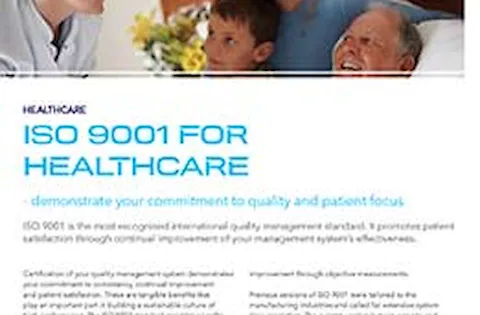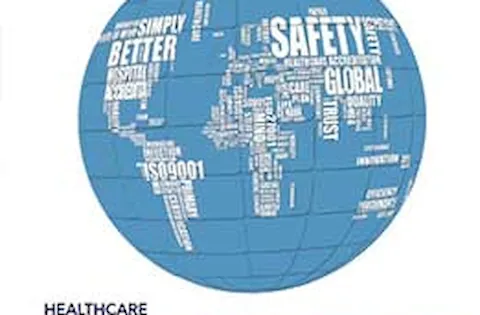ISO 9001 in Healthcare: ISO certification for health and safety
Demonstrate your commitment to quality and patient focus.
ISO 9001 in Healthcare: ISO certification for health and safety
Certification of your quality management system demonstrates your commitment to consistency, continual improvement and patient satisfaction. These are tangible benefits that play an important part in building a sustainable culture of high performance.
The ISO 9001 standard provides specific requirements for a quality management system that will enhance your ability to consistently deliver care that meets patient needs - as well as statutory and regulatory requirements. Independent assessment and certification of your quality management system by DNV - Business Assurance gives a clear demonstration to stakeholders that you work to apply an effective quality management system in your organisation.
Why ISO 9001 for healthcare?
Improving quality and enhancing patient safety through the implementation of a quality management system is the best way to provide patient centred care. ISO 9001 provides a model for a quality management system which focuses on the effectiveness of clinical, business and support processes to ensure high quality care is provided. The standard promotes the adoption of a process approach emphasizing the requirements, added value, process performance and effectiveness, and continual improvement through objective measurements.
Previous versions of ISO 9001 were tailored to the manufacturing industries and called for extensive system documentation. The current version is more generic and can be applied in organisations of any size and industry. It’s increasingly recognized as a well suited standard for healthcare organisations that wish to deliver high quality, patient centered healthcare.
Why is certification good for my organisation?
Certification of your management system to ISO 9001 demonstrates your organisation’s ability to meet their requirements and needs.
It will help you:
- Ensure quality and safety in the treatment of patients.
- Identify and manage risk to patients, staff and the organisation.
- Determine, manage, monitor and improve complex and interrelated processes.
- Comply with relevant international and national legal requirements.
- Implement best practice routines and procedures.
- Prevent incidents from occurring.
- Identify areas of improvement and ensure continual enhancement of your quality management system.
- Provide assurance to patients, authorities and other stakeholders that you have implemented a well-functioning management system and are committed to continual improvement.
How do I get started?
In order to put a certified quality management system in place you need to know the requirements in the ISO 9001 standard and to set clear targets for implementation and assessment of the management system. Certification and continuous improvement of your management system is a journey. We perform yearly audits and re-certification every third year.
These are important steps to get started:
- Get familiarized with the ISO 9001 standard. Training programs are available, and the standard can be acquired on iso.org.
- Make an assessment of your current management system.
- DNV - Business Assurance offers pre-assessments to identify gaps.
- Take action to improve the areas that need enhancement to prepare for certification.
- Ensure top management commitment. A good management system needs to ensure commitment from top level through to the entire organisation.
- Engage an accredited certification body to get started with the certification process
More information

ISO 9001 for healthcare
Demonstrate your commitment to quality and patient focus.

Healthcare brochures and flyers
Download our services flyers and brochures
Download healthcare standards
Guidance for accreditation
Accredited hospitals
List of hospitals accredited to the international standard by DNV GL Healthcare
Healthcare Research & Innovation
Putting DNV GL’s competence from safety critical industries to work on improved patient safety, globally

Training
Relevant insight in an active learning environment.

Your added value
Find out more on the digital customer experience.
ViewPoint Surveys
See the findings of our ViewPoint customer panel surveys
Have you signed up for our newsletter?
Subscribe to our newsletter for the latest updates



